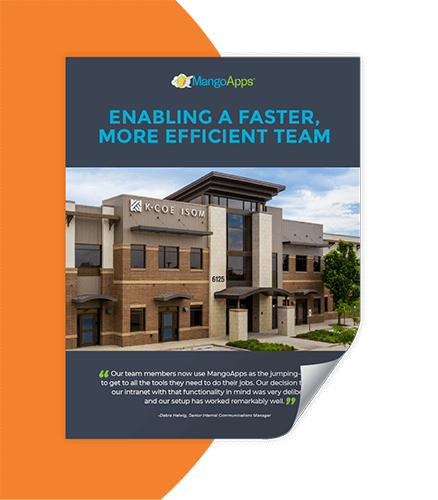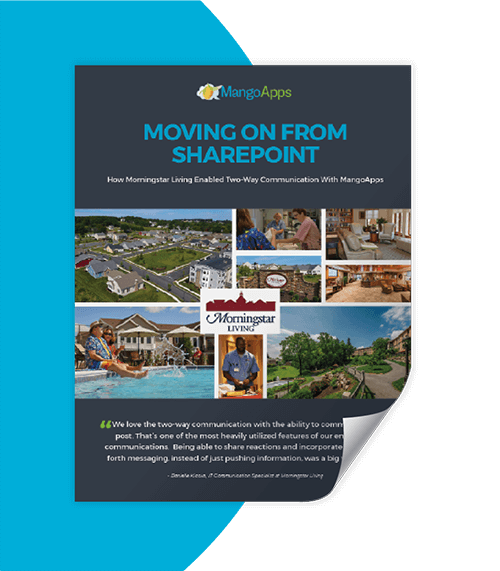Quick decision-making is an overlooked, powerful tool. Often, analytical approaches to decision-making – while regarded as safe & responsible – drag out far too long, which delays results.
One reason rational, measured systems tend to take time is the lack of available, relevant information. By providing your company access to necessary information & encouraging knowledge-sharing, you can speed up the decision-making process, thus increasing productivity, momentum, and innovation.
This article covers common causes of prolonged decision-making, what quick decision-making entails, and the steps to making speedy verdicts.

Enable a faster, more efficient team!
Learn how KCoe Isom, a top 100 accounting firm, used MangoApps to:
- Build a repository of company info
- Reduce reliance on email
- Bring all employee resources into one convenient dashboard
What slows down decision making
Before we dive into tips and tricks for quick decision-making, it’s important to recognize why we tend to stagnate during the decision-making process. For starters, it’s common to want all the information possible before making a choice. People feel safer when they have facts that will back up their decisions.
But what ends up happening is the gathering of too much information. Collecting data across scattered means ends up being a procrastination method; while you may come across interesting information, it’s rarely needed and doesn’t aid in your decision. Rather, it keeps you from dealing with the issue at hand and manifests as analysis paralysis.
Another common cause of prolonged decision-making is slow communication. In an attempt for guidance, we often reach out to others in hopes of being inspired or validated. Rather than trusting our instincts and pulling from our own experiences, we feel safer putting off important decisions until we gain comfort through someone else’s judgment. Sometimes, waiting for a reply can end up being a waste of valuable time.
While we wait to receive additional facts or advice, we drag out the fruition of any possible outcome – good or bad. If you make the “right” choice, you’ll reap the benefits sooner than later; if you make the “wrong” choice, it’ll be done and over with, allowing you to learn, move on, and try again. So either way, why wait?


Elements of Quick Decision Making
For many people, quick decision-making doesn’t come easily. Luckily, there are tips and tactics for getting into the habit of acting fast. We’ve put together a list of practices you can use in various situations that will make quick decision-making second nature.
#1. Gather feedback from people with relevant skills & experiences
Sometimes additional information is needed to make a rational decision. When reaching out to others for help with a decision, be sure not to cast too wide a net. Zero in on experts and those closest to the action rather than asking anyone & everyone. This way, you won’t be overwhelmed with opinions or data, but you’ll have a small group of reputable sources you can trust for guidance.
Also, be sure to seek advice from those who actively deal with the issues you’re trying to solve. More often than not, higher-ups are not the ones coming face-to-face with problems; collect insights from those who are immediately impacted by the issue, use their thoughts as direction, and give them credit where credit is due.
#2. Fix what you can, then make a plan
Considering the big picture can be a hindrance. Instead, focus on how the situation can be remedied at that moment. Then, plan to spend more time later figuring out how the root cause of the issue can be resolved. Ruminating on long-haul options can keep you and your team in tough situations longer than needed. By implementing a quick fix, you can curtail stress then and there. And afterward, set aside time to devise a proper solution to the underlying issue.
#3. Accept responsibility
One thing that keeps many of us from making a decision is the fear of failing. No one likes being wrong, but nearly every choice you make comes with that risk. Once you’ve fully come to terms with making mistakes and being liable, quick decision-making will be easier.
Plus, accepting accountability builds trust with your team. Once you feel confident in your decisions, your colleagues will feel confident in you, too.
#4. Practice, practice, practice
If you want to improve your quick decision-making, there’s only one thing you can do: practice! Even when it comes to seemingly small choices, start weighing the risks & potential repercussions, as well as the long-term & short-term benefits or costs.
Applying these decision-making techniques to personal, low-stake situations makes it a habit and will come naturally when it’s time to make more crucial choices.
#5. Act with urgency
While seeking feedback and weighing pros & cons help you make educated decisions, they certainly don’t speed things up. That’s why it’s important to practice each of the above techniques with a sense of urgency – the goal is to strike a balance between thoughtfulness & intuition.
Don’t let delayed responses, information overload, or self-doubt slow you down. Set timers, trust your gut, and remember that the faster the decision is made, the sooner you’ll see results.

Enable two-way communication!
Learn how Morningstar Living, a not-for-profit continuing care community, uses MangoApps to:
- Connect & engage employees
- Distribute top-down information
- Create a seamless user experience
Stages of quick decision-making
Now that you’re equipped with quick decision-making tips, let’s go over the steps of making a decision. Commit these steps to memory as something to latch onto when it comes time to make an important choice – following each step will help you focus and feel less anxious. Plus, thoroughly running through each stage will help you identify what aspects of decision-making you have trouble with.
#1. Define the dilemma
Before you can make a decision, you have to understand what the decision is you’re making. Get a clear understanding of the situation – the clearer the situation is, the clearer the solution will be.
#2. Make a “default decision”
A “default decision” refers to this hypothetical: if you had to make a choice right now, without any other information, what would it be? This gives you something you can compare different options to as you gather feedback and input. It also allows you to tap into your own experiences, motivations, and objectives before being influenced by others.
#3. Identify your choices
Now it’s time for a choice to be made! Base it on two things: associated opportunities and associated risks. Consider how your decision would bring about opportunities related to the situation. Also, think about the risks your choice could potentially create. Does your decision aid in creating positive outcomes for you and your team? Or will it manifest unfavorable results?
#4. Analyze your process & results
Once the decision has been put into action, ask yourself the following questions:
- Was the objective reached?
- Was the problem addressed?
- Is the outcome what you intended?
Upon answering these, you can then review your decision-making process:
- Given the time, did you make the best choice possible?
- What other accessible info would have led to a better decision?
- Did the risks & opportunities you anticipated come to light?
By analyzing your decision-making process, you will see how it influences the end results, making you a better decision-maker as you go.

MangoApps as a knowledge-sharing platform
With a knowledge-sharing platform, factors that slow decision-making are tossed to the wayside. Providing tools for prompt, transparent communication and easily accessible information, MangoApps can help improve quick decision-making within your organization. As a user-friendly superapp (available on both desktop and mobile), MangoApps makes information gathering & communication fast & convenient. Take a look at the list below to see how MangoApps’ knowledge-sharing & communication features can better your quick decision-making process.
Company Directory
Instantly find the experts you need with the Company Directory feature. Browse users from across your organization to receive advice & feedback from those who would know. With detailed profiles clearly showing who’s knowledegable in what fields, you can contact relevant people to aid in your decision.
Chat
MangoApps’ Chat tool provides fast communication. As a quick, reliable way to converse, you can ask for insights from anyone and receive near-immediate replies. The Chat feature shows who’s currently online, so you can reach out to folks available to talk right then – no need to put off your decision while you wait for an email or phone call.
News Feeds & Workspaces
Segmented Workspaces for different departments of your company allow you to conveniently communicate with or observe those who relate to your dilemma. If you’re faced with a decision regarding a marketing concern, access the marketing department’s Workspace to gauge their opinions or ask for input. Plus, scroll the always up-to-date News Feeds for a bird’s eye view of current discussions – you’ll quickly find guidance in your team’s open conversations.
Search
Don’t let information overload hinder your quick decision-making. With MangoApps’ Search function, find just what you need in seconds. Use the Search tool’s wide variety of filters to narrow down your results, assuring you don’t get caught up in irrelevant research.
Plus, historical information within a MangoApps domain is all captured and logged, regardless of department or office location. With that, you’ll have access to potential evidence of other folks in your organization needing to make a similar choice in the past. With MangoApps’ Search, you can easily find their experience and use it as an entryway to guide your own decision.
Libraries
Create a central repository of documents, graphics, and more with the Library tool. Have convenient access to resources whenever your decision requires additional materials. With MangoApps’ Libraries, you can ensure you and your team have illuminating references that are easy to find and won’t delay your decisions.
To learn more about the many knowledge-sharing & communication tools MangoApps offers, visit mangoapps.com or schedule a demo below!







